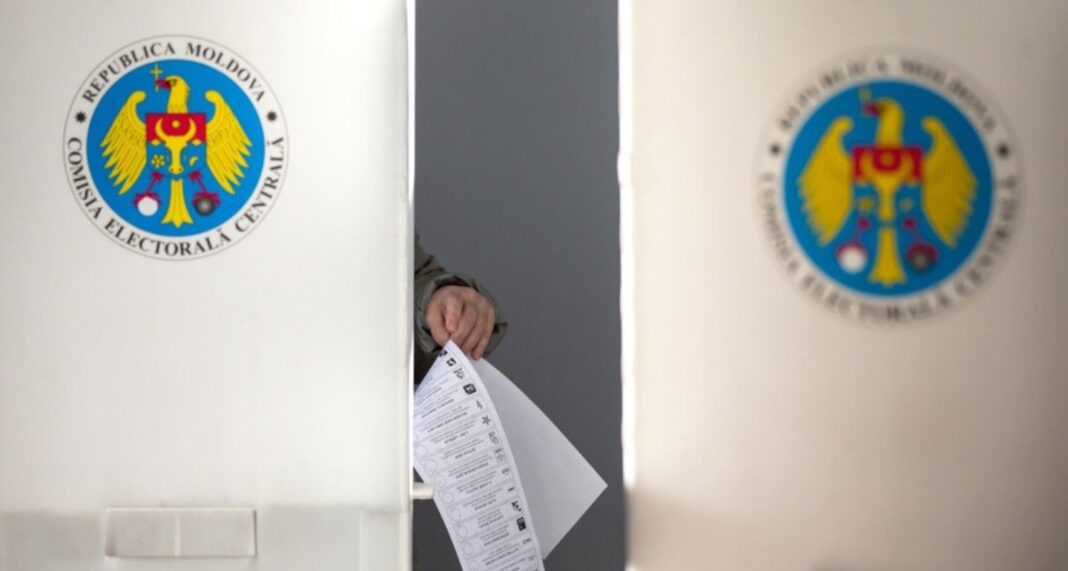Tamás Szele / Magyar Hang
* The article was published prior to election results; final numbers and Moscow’s interference was reported here.
A Non-Military Victory for Moscow? Moldova’s Decisive Vote
On Sunday, 20th October, Moldova faced a turning point: citizens casted votes that may determine not only the future presidency but also the constitutional commitment to EU membership. Although a second presidential election round may be necessary, the referendum on European integration carries even greater significance, as it could shape the nation’s path for decades to come.
Current polling suggests that incumbent President Maia Sandu remains highly favored, but she faces an organized network of opposition from supporters of fugitive Moldovan oligarch Ilan Shor, who commands a substantial base of 120,000 to 400,000 people (around 10% of voters). Shor’s followers are expected to vote as directed, including against EU integration in the referendum. A failed referendum would be a significant setback, providing Sandu’s opponents an excuse to argue that Moldova is not interested in joining the EU.
Calm Before the Vote
With 36.1% support, Sandu leads in the presidential race, and 63.2% of surveyed voters plan to back EU membership in the referendum. Although this referendum does not directly influence the pace of EU integration (which Moldova is already negotiating), it is essential for Sandu to mobilize public support for her platform. Since taking office in 2020 and later securing parliamentary control for her Action and Solidarity Party, Sandu has associated her name closely with “European integration.”
However, Sandu’s presidency has faced multiple challenges, including the pandemic, an energy crisis, and economic strain from the war in Ukraine. Traditional Russian and Belarusian markets, crucial for many Moldovan agricultural exports, have become less accessible, creating additional hardships for Moldova’s economy.
Despite initial promises to root out corruption and reform the justice system, Sandu’s government has struggled to implement these changes. Transparency issues and stalled reforms have led to widespread frustration. Even Sandu acknowledges the setbacks, urging continued efforts to cleanse the justice system despite the ongoing difficulties.
A Rival Born from Within
Sandu’s government’s decision to remove prosecutor Alexandru Stoianoglo has proved controversial. Fired in 2021 on accusations of abuse of power and corruption, Stoianoglo’s dismissal has since been criticized by the European Court of Human Rights as a violation of his right to a fair trial. Many observers, including former Moldovan UN representative Alexei Tulbure, argue that Stoianoglo’s removal was poorly justified, resulting in a significant political opponent for Sandu.
Although Stoianoglo currently has only 10% voter support, he embodies both pro-European and pro-Russian sentiments, appealing to voters who sympathize with Moscow despite the Ukraine conflict. Backed by the Socialist Party, Stoianoglo’s platform advocates for maintaining Moldova’s European course while fostering relations with Russia.
Shor’s Influence
Of Moldova’s eleven presidential candidates, none openly oppose EU integration, though several favor balanced relations with Russia. Yet, Ilan Shor—a businessman convicted in absentia for embezzling $1 billion in 2014—has become the leading anti-EU voice, promoting Moldova’s alignment with Russia and the Eurasian Economic Union. Operating from Moscow, Shor remotely oversees a robust support network and the “Victory” political bloc, backed by members of the Eurasia organization, chaired by Russian State Duma representatives.
Through Telegram channels and social media, Shor’s team actively recruits supporters in Moldova, who spread pro-Eurasian messages and receive compensation for their activism. Investigative journalists have uncovered Shor’s extensive payment network, revealing that tens of thousands of Moldovans are on his payroll, with millions of dollars flowing into Moldova from Russia to fund “Victory” bloc operations.
What’s at Stake?
Shor’s network, estimated to involve as many as 300,000 Moldovans, could significantly sway the election. Although Shor’s Victory bloc lacks an official candidate, analysts anticipate that Shor will endorse a preferred candidate by the final hours of the campaign, which could influence the results.
A failed referendum, whether due to low turnout or active opposition, would embolden pro-Russian forces and could set the stage for a political shift in the 2025 parliamentary elections. Without firing a single shot, Moscow would have an opportunity to shift Moldova’s geopolitical orientation back toward Russia, a strategic win given the current challenges in Ukraine.
Conclusion
Today’s Moldovan election and referendum are about much more than determining the next president. They are a geopolitical test for Moscow’s ability to regain influence in Moldova, where its standing has weakened since the Ukraine war. As internal and external forces vie for power, the stakes are high: propaganda, rational interests, and political alliances will collide in what could be a decisive non-military victory for Moscow if the referendum fails. The results should be clear by evening, revealing Moldova’s next steps on the world stage.

